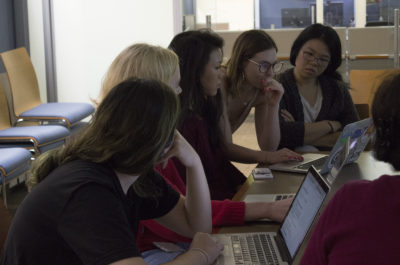
From programming scientific software to redoing a portfolio website, coding has become one of the most in-demand skills in many industries. Girls Who Code BU hosted their first “Introduction to Web Development” workshop to make learning about coding more accessible to women of all majors.
Girls Who Code BU hosted their first “Introduction to Web Development” workshop in the BU Hariri Institute of Computing on Sunday. A group of around 12 non-coders gathered to learn how to create and design their own websites with the help of the president of the club, Fiona Whittington, a junior in the Boston University College of Communication.
Using software such as GitHub, a site that allows you to create and manage web projects, and Bootstrap, a site that provides coded templates for simple layouts of websites, Whittington demonstrated how to get started.
Girls Who Code BU decided to host workshops leading up to the event to “allow women the opportunity to explore computer science and show them that it’s not as difficult as they think,” Whittington said.
With a welcoming of cookies, music and introductions, people took their seats as Whittington began her presentation of how to create and edit your own website. Whittington said she hoped this workshop would become a comfortable place for women to feel empowered and confident that they can code.
“People feel intimidated by coding, so Girls Who Code BU creates a safe space with female support instead of competition, which is something in the general the world needs,” said Dorothy Spector, a member of Girls Who Code BU and a junior in the College of Arts and Sciences.
The attendees, mostly students majoring in subjects other than computer science, observed and replicated Whittington’s instruction as she assisted Spector in creating her first website using GitHub.
“I’m a huge project-based learner and I feel like I can’t learn how to do something if I don’t have someone doing it right next to me, so that’s how I’m going to lead this workshop,” Whittington said.
Participants were given step-by-step instructions to set up their own accounts and successfully manipulate code to create a website to their liking.
“Github allows you full control of your website and looks a lot more impressive than other softwares,” Whittington said. “It also doesn’t cost any money.”
Though the event was open to all genders, their main focus, and goal of their club, was to “get more girls involved, because there’s such a stigma against coding [and] … STEM, which is very male dominated,” said Spector.
According to Whittington, BostonHacks — BU’s annual hackathon — is also incredibly male dominated, and she said she feels women are intimidated and not welcomed. Whittington said she wants to inspire women to not be afraid of coding, and know they have the skills to succeed.
“[Girls Who Code BU] shows you can do really cool things without having to be a software engineer. It really is a tangible skill, and it’s so applicable to other fields in the workforce,”said Minjae Lee, a freshman in the College of General Studies, who attended the workshop.
This workshop, the first of a four-part series, is just the beginning, Whittington said. Learning to create and edit websites using a template seems simple enough, but Girls Who Code BU are ready for more.
“Knowing how people communicate through a computer can relate to all fields,” Spector said. “It’s really slow in the beginning, because you’re getting everything set up, but really you’re creating a foundation.”
As the event came to a close, attendees wrapped up their new projects, now having the ability to make simple edits to the codes of their sites. The club also will host more events like this soon.
“I want people to go home and tell their friends that coding isn’t that bad and that they’re proud to show them what they made,” Whittington said. “I want to inspire them to continue to empower other women too.”
Whittington and her club are reaching out to women at BU to let them know that they are capable to code and encourage them to explore the world of coding.
“I remember taking my computer science course in high school where there were 25 males and I was the only girl,” Lee said. “That’s when you know something needs to change.”

























































































































